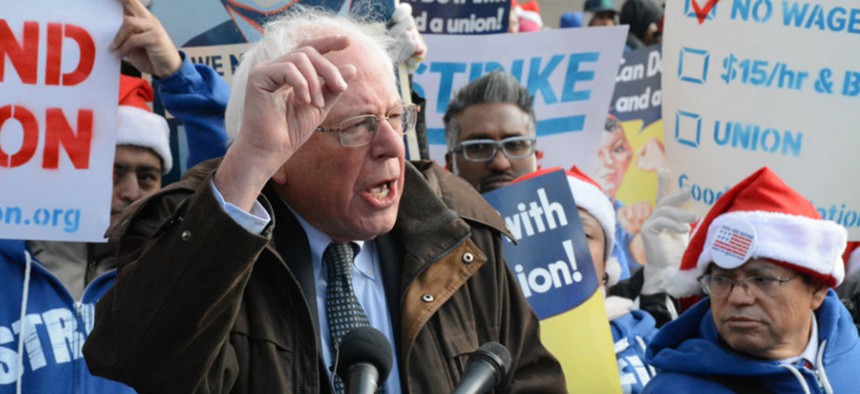
Sen. Bernie Sanders, I-Vt., speaks during a December 2014 protest seeking higher hourly wages for federal contract employees. Flickr user FitzGibbon Media
Are Low-Wage Federal Contract Workers Getting Ripped Off?
Good Jobs Nation has filed a complaint with Labor on behalf of contract janitors, bus drivers and groundskeepers.
This story has been updated.
An advocacy group for low-wage federal contract workers is alleging that some contractors are breaking the law by not paying their employees enough.
Good Jobs Nation has filed a complaint with the Labor Department on behalf of 65 federal contract workers, including janitors, bus drivers and National Zoo groundskeepers. The group says those contract employees have been systematically deprived of proper wages and benefits required under the 1965 U.S. Service Contract Act.
The organization is seeking more than $1.6 million in “stolen wages” in addition to “immediate implementation of the wage and benefits standards mandated by law,” according to a press release.
Some contract janitorial staff at the Education Department, for example, earn between $9 and $10 per hour without benefits, which violates the SCA janitorial rate of $11.83 an hour plus $4.02 per hour in benefits, according to the complaint. Contract tour bus drivers working for the National Park Service are paid roughly $16 an hour, even though they are supposed to earn $20.85 an hour under the law, the complaint said.
“We rely on public aid and charity to feed our children,” said Sonia Chavez, a contract worker who cleans the office of Education Secretary Arne Duncan, during a call with reporters on Thursday morning. Chavez, whose husband is also a contract janitor, spoke through a translator.
“If it’s happening at the headquarters in Education and at the National Zoo, it’s likely happening across the country,” said Paco Fabian, communications director for Change to Win, a coalition of labor unions representing many low-wage workers, during the briefing.
Some contractors are underpaying their workers by exploiting loopholes in contract wage laws, Good Jobs Nation alleged. The SCA requires that federal contract workers must be paid by their employers no less than the minimum wage and benefit rate set for their occupation and locality by Labor. In 2014, President Obama issued two executive orders related to federal contractors and pay. In one of them, he raised the minimum wage for federal contractors to $10.10 per hour, up from $7.25 an hour. That took effect in January 2015, but only applies to new or renewed contracts. The other executive order, issued in July, sought to crack down on contractors with a record of not complying with labor laws.
But according to Good Jobs Nation, the administration’s efforts haven’t been enough. “We’ve already won two presidential orders to boost the minimum wage to $10.10 and end wage theft on federal contracts,” said the group in a statement. “But workers need more than the minimum to survive.”
The Labor Department said in a statement that it "takes all allegations of wage violations seriously" and will "review the complaint and determine the appropriate steps to take."
The Professional Services Council, a trade association that represents federal contractors, did not comment on the specific complaint, but said Labor’s Wage and Hour Division has a robust investigative and enforcement mechanism to deal with concerns over such contract violations. If the companies or an agency is out of compliance with SCA, “then there are remedies for that, including making the workers whole,” said Stan Soloway, president of PSC. “And we certainly support appropriate enforcement.”
Soloway also said that the “sheer complexity of the SCA means that violations are almost impossible to avoid.” PSC, together with Labor, conducts training for contractors on SCA compliance annually, Soloway said. “The majority of ‘violations’ are technical in nature, are addressed through the various remedies available, and are generally seen for what they are: honest and/or administrative errors, errors often created by the government itself, etc.” Soloway said those types of issues are “far from evidence of ‘scofflaws’ or large-scale 'abuse.' "
(Image via Flickr user FitzGibbon Media)







